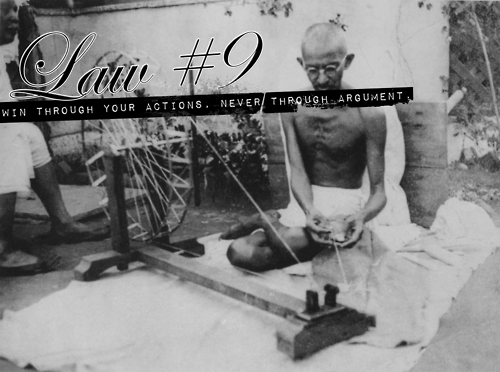Mahatma Gandhi’s life is full of stories and anecdotes about clashes that end up bringing great doses of wisdom. In fact, this man became famous and made history for being the first to propose a “war” without violence.
They say, for example, that he once sat down to eat with a professor at the University of London. The professor asked him to leave because “birds and pigs can’t eat together. “Gandhi stood up and said, “Don’t worry, Professor, I’m going to fly. “
“The purpose of any discussion should not be victory, but progress. “Joseph Joubert?
Gandhi almost always achieved his goals in the discussions, but he did so with such intelligence and grace that he always taught his opponent something, his intention was not to win the discussion, but to learn from this situation, here we will detail some of Gandhi’s suggestions for a successful discussion.
For Gandhi, any prospect of problem must also include the behavior of the adversary. Given this idea, he managed to destroy the monopoly of the British textile industry and then went to each of the factories to apologize for the layoffs he caused.
He has always carefully studied all subjects; not only does he have a superficial view of the world, he has read, deepened, consulted and all this has allowed him to form a reasoned and solid opinion on any subject, which is certainly key to any debate.
He believed that the strength of the body contributed decisively to the strength of the mind. Gandhi was in good physical shape, allowing him to endure difficult times with incredible recoverability. Training to strengthen the body brings temperance, strengthens willpower and self. -control.
In turn, patience is the training of the mind. Gandhi said that a wall must be built brick by brick, and that everyone has their time to adapt to it. Patience is a characteristic of the strongest minds. Not giving in on the first impulse is the key to success, especially in a confrontation.
Gandhi preached universal ideas, his principles were not the product of a regionalist or capricious vision, on the contrary, all humanity was present in his ideas and struggles, his doctrine initially focused on his own people, but he was inspired by universal values.
This leader valued emotions, his speech was not purely ideological, he tried to understand the position of his opponents and took into account what they might feel, so hundreds of thousands of people around the world followed him and admired him, even if they did not ‘ Do not share his cause. Winning one match doesn’t necessarily mean canceling the other.
The simplicity of discourse is something that characterizes great leaders; they don’t speak to be admired, they talk to be understood, and the best way to promote understanding is to use simple language that everyone can understand.
It would be populism if there were interests hidden behind discourse, but if simple words do not hide hidden truths, they reach people’s hearts. A sincere and authentic discourse has great power to convince and respect. A verbal discussion is won by the sincere, and deep, simple, lying-free arguments.
Gandhi turned his autonomy into a way of building freedom. He made his own clothes and other everyday items. He knew that the bonds of dependence do not arise from great actions, but from small details. And he attacked evil in the egg.
It took him 55 years to complete India’s independence, which was his great dream, he made his way: without resorting to violence, he went through many difficulties before achieving his goals: difficulties of all kinds, even conflicts with himself. Deep down I knew that perseverance is the key to opening any door and that the capacity for perseverance makes us move forward to victory.
All of Gandhi’s teachings have left us a valuable list of human values, his triumph was a triumph of the spirit, and he marked a before and after, the greatest of all his precepts was to confront him without the goal of destroying the other. That way, there’s never a defeat, because it’s a sure way for everyone to end up winning, even if they don’t win all they want.
Main image courtesy of Whooli Chen.

